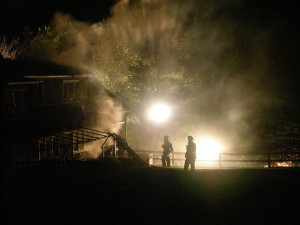You’re smart. Make sure your goals are too!
Do you make effective goal setting a habit or a luxury?
 On an emergency call, in station, or in your personal life have you set goals for yourself or others that seemed so clear when you set out, but somehow fell apart when you actually started work? Setting and accomplishing goals is a common crucial aspect of leadership, education, and career development in emergency services. If you’re reading Rescue Digest you already know that, but our conversation today is about how to be “SMART” about it every time. SMART is an acronym to help keep our brain from fooling us that we’ve set clear and effective goals when we actually haven’t.
On an emergency call, in station, or in your personal life have you set goals for yourself or others that seemed so clear when you set out, but somehow fell apart when you actually started work? Setting and accomplishing goals is a common crucial aspect of leadership, education, and career development in emergency services. If you’re reading Rescue Digest you already know that, but our conversation today is about how to be “SMART” about it every time. SMART is an acronym to help keep our brain from fooling us that we’ve set clear and effective goals when we actually haven’t.
SMART goals. Maybe it’s a new phrase to you. Maybe it’s familiar, but you couldn’t name exactly what it is. Maybe you know it so well you could’ve written your masters thesis on it. Regardless of how well you know them, this article is about putting them into practice and step one is to get into the habit of considering five critical components of your goal every time you set one!
SPECIFIC: We start by being SPECIFIC because at the outset of a task we want one thing, but we find that when we have to articulate the outcome (actually say the way we want the world to be when the task is finished) our vision becomes a bit more clear. What seems to be the easiest aspect of the goal we’re going to set is often actually the most challenging to really do. Don’t just “feel” what you want to do. Being SPECIFIC means being able to articulate exactly what you want to accomplish. If it is difficult for you to verbalize exactly how you want the world to be a measurable with what is wrong with me changed when you’re finished, then it’s going to be near impossible for you, or anyone else to achieve your goal.
MEASURABLE: If you haven’t established exactly where the finish line is, how is everyone going to know when to stop running? SPECIFIC, helps us identify what we want changed in the world, MEASURABLE is where we identify “how much” and how we’re going to know when we’ve done it. This is often the step when projects expand. Sometimes it can be challenging and frustrating, but to realize our goal we have to measure our progress as we work.
ACHIEVABLE: It is important to reach beyond your grasp, but to set impossible goals for yourself and others can be malicious, whether you mean it to be or not. Goals should be set to stretch what has been done before, but should not be set up from the start to build anxiety, anger, and frustration. This is also the step where we consider if we have the influence and resources to accomplish our goal. If we do not, we don’t have to say that our goal will never be ACHIEVABLE, just that now is not the right time. Your goals don’t ever need to be easy, but they must be able to happen in a real way.
RELEVANT: While this should be something that must have been considered from the very beginning, goals often evolve and develop through the very process of making them SPECIFIC, identifying how they will be MEASURABLE, and establishing in what way they will be ACHIEVABLE. RELEVANT is where we look at how this goal ties in to the big picture. How does this goal allow us (or someone else) to achieve our objectives. The phrase that sometimes comes up here is being able to “kill your darlings.” That is, sometimes we may feel that we want to accomplish this goal, but upon considering it’s RELEVANCE we see that it is not the next, right step.
TIMELY: In the world of candy rainbows and sparkly unicorns we can take all the time we want to work on one thing at a time. Sadly, in the real world, we have other things to do. TIMELY in this context means that we have to articulate how much time we have to achieve this goal, or what our targets are for when each step is to be accomplished. For long-term goals this means establishing benchmarks, signposts to help keep us and our team on track when the endpoint of the goal may be too far out to see clearly. For visible short-term goals this can seem easy, but we have to ensure that the short-term goal in front of us does not interfere with other, concurrent short-term goals or benchmarks that we’ are your goals as smart as the re trying to accomplish for long-term goals.
SMART goals are not pie-in-the-sky dreams or vague objectives. On-scene, in the office and at home, smart leaders, educators and emergency responders use SMART goals to use minutes of thinking and planning to save hours, days, weeks, months, and years of wasted effort and frustration. Whether this is just a reminder, or the first you’ve heard of them, today is the day that you take a look at your short and long-term goals and make sure that they, like you, are very, very SMART.
 Rescue Digest Helping You Help Others
Rescue Digest Helping You Help Others